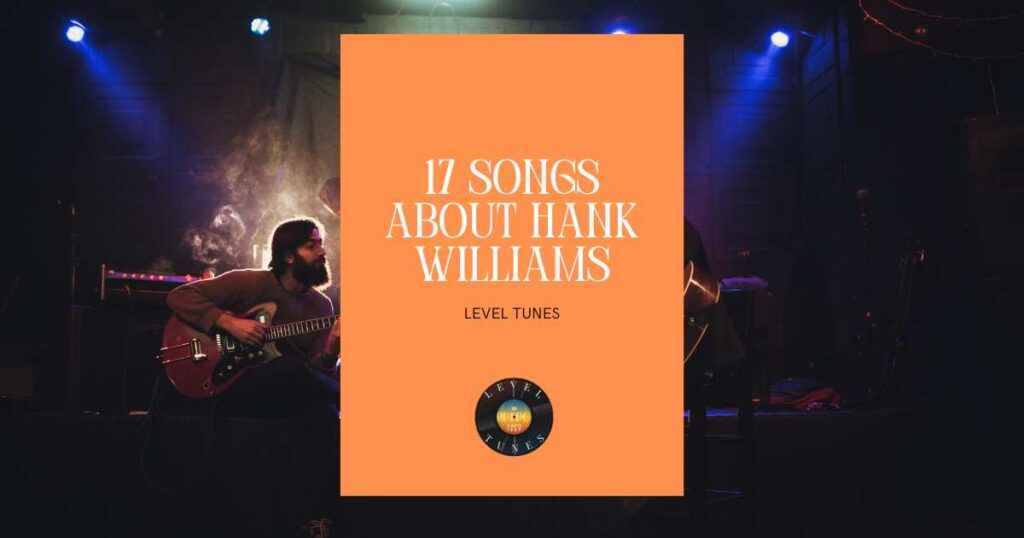17 Songs About Hank Williams: Homage Tracks
Hey there, music lovers and fellow DJs! It’s TBone here, your go-to source at Level Tunes for the best beats and tracks that stir our souls.
Today, I’m diving deep into the heart of country music’s legacy with a unique twist: a curated list of 17 songs about the legendary Hank Williams.
Why Hank Williams, you ask?
Well, as a music fan and a DJ, I’ve always been fascinated by how artists influence each other.
Hank Williams wasn’t just a country musician; he was a cornerstone of American music, whose life and tunes have inspired countless songs across genres.
This list celebrates the profound impact Hank has had on music, offering a glimpse into the respect and admiration artists from all corners of the music world have for him.
Whether you’re a die-hard Hank fan or just curious about his legacy, these songs weave a story that’s as compelling as Hank’s own.
So, let’s dive into this musical journey together and explore the tunes that pay homage to the unforgettable Hank Williams.
Here are the songs about Hank Williams that you can check out:
List Of Songs About Hank Williams
Songs about Hank Williams in a list format:
“The Ride” by David Allan Coe
David Allan Coe’s “The Ride” is a haunting encounter between a hitchhiker and the ghost of Hank Williams. Released in 1983 on the album “Castles in the Sand” under Columbia Records, this song captures the essence of Hank’s enduring influence on country music. Coe’s gritty vocals and the eerie storyline resonate with anyone who’s felt the chill of Hank’s music in their bones. The song cleverly weaves in references to Williams’ hits, making it a tribute to his timeless appeal. “The Ride” stands out for its storytelling prowess, transporting listeners on a ghostly journey with country music’s lost son.
“Hank Williams, You Wrote My Life” by Moe Bandy
Moe Bandy’s heartfelt homage, “Hank Williams, You Wrote My Life,” from the 1975 album of the same name, released under Columbia Records, dives deep into the personal connection fans feel with Hank’s music. Bandy articulates how Hank’s songs have a unique way of speaking directly to the listener’s experiences, making it a deeply personal tribute. The song’s straightforward country arrangement, coupled with Bandy’s sincere delivery, underscores the profound impact Hank’s lyrics have had on individuals’ lives. It’s a testament to the power of songwriting and Hank’s genius in capturing the human condition.
“Are You Sure Hank Done It This Way” by Waylon Jennings
Waylon Jennings questions the direction of country music and pays homage to Hank Williams in “Are You Sure Hank Done It This Way.” Released in 1975 on the album “Dreaming My Dreams” under RCA Records, Jennings laments the commercialization of country music while celebrating Hank’s authentic sound. The song’s driving beat and Jennings’ distinctive voice highlight the longing for a return to the roots of country music, embodying the spirit of Hank Williams. It’s a powerful reminder of Hank’s lasting influence on the genre and a call to preserve its original soul.
“Midnight in Montgomery” by Alan Jackson
Alan Jackson’s “Midnight in Montgomery,” from the 1992 album “Don’t Rock the Jukebox” under Arista Records, is a chilling encounter with Hank Williams’ spirit at his gravesite. Jackson’s vivid storytelling and the atmospheric production transport listeners to a moonlit cemetery, where the legacy of Hank looms large. The song blends reverence with a touch of the supernatural, capturing the mystique surrounding Hank’s death and his ongoing presence in the heart of country music. It’s a standout track for its ability to blend historical homage with the personal impact of Hank’s music.
“Hank’s Cadillac” by Ashley Monroe
Ashley Monroe’s “Hank’s Cadillac,” from her 2006 album “Satisfied” under Sony Records, offers a lighter, whimsical take on Hank Williams’ legacy. The song imagines taking a joyride in Hank’s Cadillac, a metaphor for the freedom and joy found in his music. Monroe’s airy vocals and the song’s breezy arrangement evoke the carefree spirit of Hank’s most uplifting tracks. It’s a tribute not just to the man but to the feeling his music inspires, making it a unique addition to this list for its celebration of the joy Hank Williams has brought to so many lives.
“The Ghost of Hank Williams” by David Allan Coe
Returning to David Allan Coe, “The Ghost of Hank Williams” further explores the lasting impact of Hank’s tormented soul on country music. This track, from Coe’s 1997 album “The Longhaired Redneck,” under Columbia Records, delves into the darker aspects of Hank’s life and legacy. Coe’s raspy voice and the mournful melody create a somber atmosphere, reflecting on the price of Hank’s genius. The song serves as a reminder of the personal struggles behind Hank’s iconic status, offering a more introspective look at the man who shaped country music.
“Has Anybody Here Seen Hank?” by The Waterboys
The Waterboys’ “Has Anybody Here Seen Hank?” from their 1988 album “Fisherman’s Blues” under Ensign/Chrysalis Records, stands out for its fusion of Irish folk and country influences. This song searches for Hank’s spirit in the modern world, blending Mike Scott’s poetic lyrics with traditional instrumentation. It’s a testament to Hank Williams’ global influence, showing how his legacy transcends cultural and genre boundaries. The track’s earnest inquiry into Hank’s whereabouts offers a metaphorical exploration of his enduring relevance in music and the collective memory.
“I Feel Like Hank Williams Tonight” by Jerry Jeff Walker
Jerry Jeff Walker’s “I Feel Like Hank Williams Tonight” is an emotional reflection on the
power of Hank’s music to evoke deep feelings, found on his 1986 album “Gypsy Songman” under Tried & True Music. This song captures the bittersweet essence of listening to Hank Williams during times of heartache and reflection. Walker’s raw vocal delivery, accompanied by simple, poignant instrumentation, mirrors the simplicity and depth of Hank’s own performances. It speaks to the universal experience of finding solace and understanding in Hank’s songs during personal moments of sorrow. This track stands as a beautiful acknowledgment of how music can comfort and connect us to the broader human experience, a tribute to Hank’s unparalleled ability to capture the heart’s deepest emotions.
“Tower of Song” by Leonard Cohen
Leonard Cohen’s “Tower of Song” is not directly about Hank Williams but includes a poignant reference that pays homage to Hank’s influence on songwriters across genres. Featured on his 1988 album “I’m Your Man” under Columbia Records, Cohen’s deep, meditative voice and minimalistic arrangement create a reflective space to ponder the nature of songwriting and the legacy of those who’ve shaped it. The line “I said to Hank Williams: how lonely does it get? Hank Williams hasn’t answered yet” connects Cohen’s existential musings to the loneliness and intensity found in Hank’s work. This song is a tribute to the lasting impact of Hank Williams on the craft of songwriting, highlighting Cohen’s respect for Hank as a fundamental figure in the pantheon of great musicians.
“Pictures from Life’s Other Side” by Hank Williams III
Hank Williams III, the grandson of Hank Williams, directly channels his grandfather’s spirit in “Pictures from Life’s Other Side,” a track that appears on his 1999 album “Risin’ Outlaw” under Curb Records. This song, originally by Hank Williams, is reinterpreted by Hank III, creating a bridge between generations and celebrating the continuity of the Williams family’s musical legacy. Hank III’s version retains the raw emotion and authenticity of his grandfather’s original, while infusing it with his own punk-inflected country style. This rendition is a powerful homage, highlighting the timeless nature of Hank’s music and its ability to resonate with subsequent generations. It’s a poignant reminder of the personal connection Hank III has to his legendary grandfather, making it a unique and heartfelt addition to this list.
“Long Gone Lonesome Blues” by Sheryl Crow
Sheryl Crow’s rendition of “Long Gone Lonesome Blues,” Hank Williams’ classic, showcases the cross-genre appeal of Hank’s music. Appearing on the 2001 album “Timeless: Hank Williams Tribute” under Lost Highway Records, Crow’s version brings a contemporary rock sensibility to the classic country track. Her distinctive voice and the modern arrangement pay respect to the original while demonstrating Hank’s ongoing relevance in the music world. This song choice highlights the versatility of Hank’s songwriting and its ability to inspire artists across a broad spectrum of musical styles. Crow’s contribution to the tribute album is a testament to Hank Williams’ enduring influence on musicians and songwriters, regardless of their primary genre.
“Why Don’t You Love Me” by Tom Hiddleston
Tom Hiddleston’s performance of “Why Don’t You Love Me” in the role of Hank Williams for the biopic “I Saw the Light” (2015) brings a unique actor’s perspective to Hank’s music. Hiddleston’s dedication to authentically capturing Hank’s sound and spirit for the film led to a deep dive into the nuances of Hank’s vocal style and performance technique. This track, among others from the movie’s soundtrack, showcases Hiddleston’s ability to channel the essence of Hank Williams, offering a fresh take on the legendary singer’s catalog. It’s a fascinating inclusion for its blend of acting and musical performance, providing insight into Hank’s enduring legacy in popular culture and the challenges of portraying such a complex, influential figure.
“A Song for Hank Williams” by Luke the Drifter Jr.
Luke the Drifter Jr., also known as Hank Williams Jr., pays direct tribute to his father in “A Song for Hank Williams.” This track delves into the personal and professional legacy Hank Williams left behind, from the perspective of his son, who followed in his musical footsteps. Hank Jr.’s own tumultuous journey through the music industry, shadowed by his father’s legacy, adds depth and authenticity to the tribute. The song is a poignant reflection on the challenges and blessings of inheriting such a significant musical mantle. It’s a heartfelt acknowledgment of Hank Sr.’s influence on his son’s life and career, making it a deeply personal addition to this list.
“Hank” by Jason Isbell
Jason Isbell’s “Hank” is a modern reflection on Hank Williams’ lasting impact on songwriters and the music industry. Isbell, known for his storytelling and lyrical depth, explores the complexities of living up to the standards set by legends like Hank. This track, featured on Isbell’s album “Sire
ens of the Ditch” under New West Records, showcases Isbell’s ability to weave intricate narratives that speak to the human condition, much like Hank Williams did. The song not only pays homage to Hank’s musical legacy but also examines the personal struggles and aspirations of artists who continue to be inspired by him. Isbell’s thoughtful approach and emotional depth make “Hank” a compelling addition to this collection, highlighting the ongoing dialogue between past and present musicians influenced by Williams’ work.
“Setting the Woods on Fire” by The Tractors
The Tractors’ cover of “Setting the Woods on Fire,” originally performed by Hank Williams, brings a rockabilly twist to the classic country tune. Featured on their 1998 album “Farmers in a Changing World” under Arista Nashville, The Tractors infuse the song with a lively, upbeat energy that celebrates the joy and spontaneity of Hank’s music. Their rendition pays tribute to Hank’s ability to craft songs that are both deeply emotional and irresistibly catchy. This version emphasizes the cross-genre appeal of Hank Williams’ songwriting, showcasing how his work can be reimagined and enjoyed in various musical contexts. The Tractors’ “Setting the Woods on Fire” stands as a vibrant celebration of Hank’s enduring influence on music that’s meant to get people dancing and smiling.
“Hank Williams Said It Best” by Guy Clark
Guy Clark’s “Hank Williams Said It Best” from his 1995 album “Dublin Blues” under Asylum Records, is a song that pays homage to Hank Williams through its title and lyrical content. Clark, a masterful songwriter in his own right, weaves together references to several of Hank’s most iconic lyrics, highlighting the timeless wisdom and emotional depth found in Hank’s work. The song is a testament to the profound impact Hank Williams has had on songwriters across generations, with Clark acknowledging the unmatchable way Hank could capture the human experience in song. Clark’s gruff voice and the song’s stripped-down arrangement underscore the sincerity and reverence he holds for Hank, making “Hank Williams Said It Best” a poignant nod to the lasting legacy of one of country music’s greatest legends.
“Lovesick Blues” by Patsy Cline
Patsy Cline’s rendition of “Lovesick Blues,” a song famously associated with Hank Williams, showcases her incredible vocal talent and the song’s versatility. Although originally released by Emmett Miller and later popularized by Hank, Patsy’s version, which appeared on live performances and posthumously on compilations, adds a whole new dimension to the song. Her powerful, emotive delivery brings out the longing and despair in the lyrics, proving that Hank’s music could transcend the boundaries of genre and gender. Cline’s ability to make the song her own, while still paying homage to Hank’s influence, illustrates the universal appeal of Williams’ songwriting. Patsy Cline’s “Lovesick Blues” is a shining example of how Hank Williams’ music continues to inspire and resonate with artists and audiences alike.
“I Saw the Light” by Johnny Cash
Johnny Cash’s cover of Hank Williams’ “I Saw the Light” is a spiritually uplifting rendition that connects two of country music’s most iconic figures. Featured on various albums and live recordings, Cash’s deep, resonant voice adds a profound sense of gravitas to this gospel number, underscoring the song’s themes of redemption and salvation. Cash, who shared a deep personal and professional respect for Hank, infuses the song with sincerity and a powerful sense of faith, making it a moving tribute to Hank’s original. This performance not only honors Hank Williams’ musical legacy but also highlights the shared spiritual journey of two of country music’s greatest legends.
Fun Facts: Songs About Hank Williams
“The Ride” by David Allan Coe
- Fact: The song’s narrative, which features a ghostly encounter with Hank Williams, has become a favorite among fans of both country music and ghost stories. Despite its eerie theme, “The Ride” doesn’t reference any actual event but instead serves as a metaphor for Coe’s deep respect and admiration for Williams’ influence on country music.
“Are You Sure Hank Done It This Way” by Waylon Jennings
- Fact: Waylon Jennings’ questioning of the country music industry’s direction in this song became an anthem for the Outlaw Country movement, which sought to bring country music back to its roots and away from the polished Nashville sound of the time. It highlights Jennings’ desire for authenticity, much like the music of Hank Williams.
“Midnight in Montgomery” by Alan Jackson
- Fact: Alan Jackson reports having felt Hank Williams’ presence while writing this song in Montgomery, Alabama, near Williams’ gravesite. The song’s atmospheric and haunting quality captures the mystical connection many musicians feel with Hank, further cemented by Jackson’s own experience.
“Hank Williams, You Wrote My Life” by Moe Bandy
- Fact: This song perfectly encapsulates how deeply Hank Williams’ songs resonated with people’s personal experiences. Moe Bandy, by singing about how Hank’s lyrics directly spoke to his life, underscores the universal appeal of Williams’ songwriting, connecting deeply with listeners who find their own stories in Hank’s words.
“I Feel Like Hank Williams Tonight” by Jerry Jeff Walker
- Fact: Interestingly, despite its title and theme, this song captures the broader influence of classic country music on listeners’ emotions rather than focusing solely on Hank Williams. Jerry Jeff Walker’s inclusion of references to other country music legends alongside Hank highlights the interconnectedness of these artists’ impacts on the genre.
“Tower of Song” by Leonard Cohen
- Fact: Leonard Cohen’s reference to Hank Williams in “Tower of Song” illustrates the profound respect and influence Hank had beyond the country genre, reaching into folk and rock territories. Cohen’s mention of Hank places him among the “greats” in the tower of song, signifying Hank’s monumental contribution to music as a whole.
“Pictures from Life’s Other Side” by Hank Williams III
- Fact: This song, being a reinterpretation by Hank Williams’ grandson, Hank Williams III, adds a layer of familial legacy to the original. Hank III’s effort to honor his grandfather while also carving out his own musical identity speaks to the powerful influence Hank Williams has had across generations within his own family.
As we’ve journeyed through these songs about Hank Williams, it’s clear his spirit lives on in music far and wide. From eerie encounters to heartfelt tributes, Hank’s legacy continues to inspire, proving that true legends never really fade away. Let’s keep his memory alive through these timeless tunes.
Thanks for reading.
TBone




